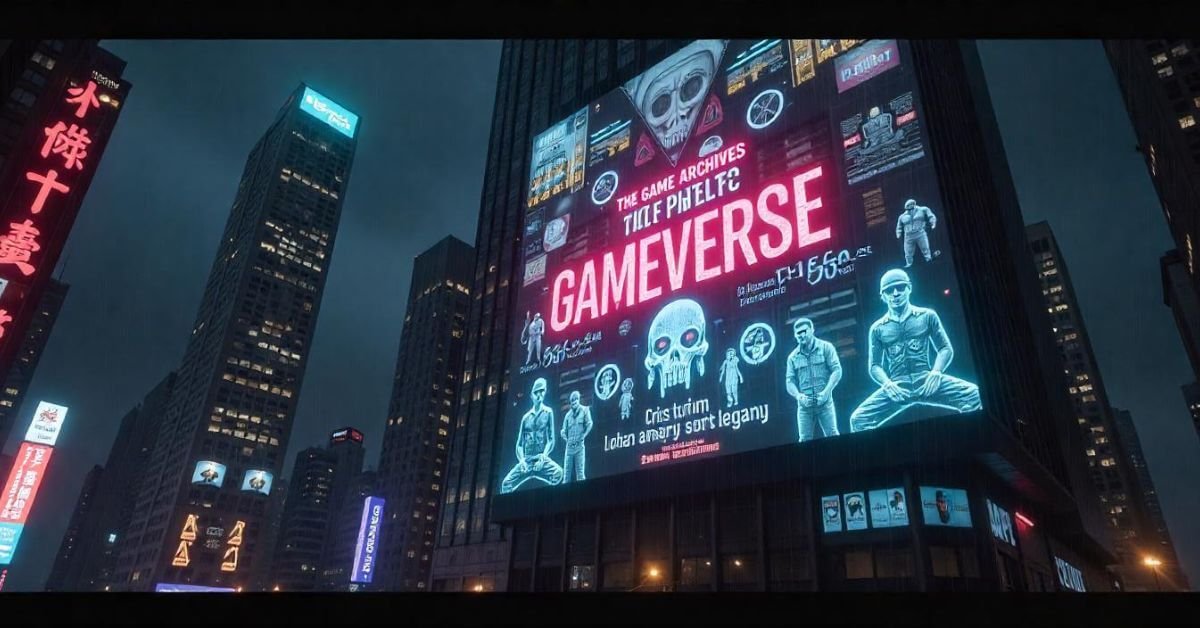
The Game Archives Gameverse is a look into the world of gaming. It explores old classics, modern hits, and gaming culture. This guide helps fans understand how games shaped history.
Do you love video games and their stories? The Game Archives Gameverse takes you deep into game history. It demonstrates how games have evolved and why they are important. You’ll find hidden gems, fun facts, and fan favorites. Step into a universe where every game has a legacy.
The Game Archives Gameverse explores the evolution of gaming. It covers retro games, modern consoles, and player communities. You’ll learn about game design, tech growth, and storytelling. The guide highlights milestones in interactive entertainment. Gamers will enjoy this journey through the gaming universe.
What Is The Game Archives Gameverse?
The Game Archives Gameverse is a collection of interconnected games, worlds, and stories that exist within a universe crafted by game developers, historians, and fans alike. It represents a culmination of interactive narratives, gameplay evolution, and cultural impact within the gaming industry. This immersive experience is designed not only for players but also for historians, fans, and those interested in the broader effects of games on modern culture.
Origins of The Gameverse: A Look Back at Gaming’s Beginnings
The journey of The Game Archives Gameverse began long before the era of 3D graphics and open-world gameplay. It all started with simple, pixelated adventures like Pong and Space Invaders. These rudimentary games sparked a revolution in entertainment, offering players an interactive experience that had never been seen before. As technology advanced, so did the complexity and storytelling in video games.
From the early arcade games to the rise of home consoles like the Nintendo Entertainment System (NES) and the Sega Genesis, the Gaming World grew. As game developers began to explore deeper narrative structures and more intricate gameplay mechanics, the Gameverse transformed into the expansive universe it is today.
Evolution of Game Genres in the Gameverse
The Gameverse encompasses a diverse range of genres that have shaped the gaming industry. From action-packed shooters to relaxing farming simulators, every genre has contributed its unique element to this ever-expanding universe.
Action & Adventure of The Game Archives Gameverse
Action and adventure games have always been the heartbeat of the Gameverse. Titles like The Legend of Zelda, Super Mario, and Tomb Raider continue to push the boundaries of storytelling and gameplay. These games are renowned for their immersive worlds, compelling characters, and engaging combat systems that keep players captivated for hours on end.
Role-Playing Games (RPGs) of The Game Archives Gameverse
Role-playing games (RPGs) have played a pivotal role in shaping the Gameverse. Games such as Final Fantasy, The Elder Scrolls, and Mass Effect allow players to step into the shoes of a hero, make decisions that affect the world, and engage in rich, narrative-driven experiences. RPGs have always been a staple of the Gameverse, offering deep storylines, expansive worlds, and complex character development.
Strategy and Simulation Games of The Game Archives Gameverse
For players who prefer a more thoughtful, methodical approach to gaming, strategy and simulation games like Civilization and The Sims offer experiences that require patience and planning. These games have contributed to the growth of the Gameverse by challenging players to think critically and manage resources while navigating complex systems.
Fighting Games and Sports
The competitive edge of gaming is often showcased in fighting games like Street Fighter and Tekken or sports simulators like FIFA and NBA 2 K. These genres bring a different dimension to the Gameverse, focusing on player skill, timing, and strategy to achieve victory. They also bring together communities of competitive players who test their mettle against one another.
The Impact of The Gameverse on Modern Culture
The Gameverse is not only a collection of games but also a significant cultural phenomenon. It has shaped the way we view entertainment, competition, and even technology. Here are a few ways the Gameverse has left an indelible mark on modern society.
Pop Culture Integration
Gaming has gone beyond being a hobby or pastime to becoming a major part of pop culture. Franchises like Pokémon, Minecraft, and Fortnite have achieved mainstream popularity, often collaborating with movies, television shows, and even music. The Gameverse has given rise to iconic characters and brands that transcend the gaming world and enter the cultural zeitgeist.
Social Interaction and Communities
Online multiplayer games have revolutionized the way people interact with each other. Titles like World of Warcraft, League of Legends, and Call of Duty have created global communities where people from different cultures, languages, and backgrounds can come together and compete. These games have blurred the lines between entertainment and social interaction, making the Gameverse a virtual space where friendships are formed and stories are shared.
Influence on Other Media
The Gameverse has also inspired countless other forms of media. Movies like The Matrix and Tron explore the concept of virtual worlds, while TV shows like Stranger Things and The Witcher have drawn heavily from gaming culture and lore. The symbiotic relationship between gaming and other media has fostered a deeper understanding and appreciation of the Gameverse.
The Future of the Gameverse: Innovations and Trends
As the gaming industry continues to evolve, so too does the Gameverse. New technologies and gameplay mechanics are constantly reshaping what is possible within these virtual worlds. Here are some trends that are likely to shape the future of the Gameverse.
Virtual Reality (VR) and Augmented Reality (AR)
Virtual reality (VR) and augmented reality (AR) are poised to revolutionize the Gameverse by offering even more immersive and interactive experiences. Games like Half-Life: Alyx have shown what is possible with VR, allowing players to step into a fully realized, 3D world where they can interact with objects and characters as if they were real.
AR, on the other hand, enhances the real world by overlaying digital elements. Pokémon Go is a prime example of AR’s potential, allowing players to interact with the virtual world in real-time and in real locations.
Cloud Gaming
Cloud gaming, or game streaming, is another technology that is transforming the Gameverse. Services like Google Stadia, Xbox Cloud Gaming, and NVIDIA GeForce Now allow players to access high-quality games without the need for expensive hardware. This innovation opens up gaming to a wider audience, making it more accessible and convenient than ever before.
Artificial Intelligence and Procedural Generation
Artificial intelligence (AI) and procedural generation are being integrated into more games, allowing for dynamic storytelling and unique experiences. AI-driven NPCs (non-playable characters) can respond to player actions in real-time, creating a more personalized gaming experience. Meanwhile, procedural generation algorithms can create vast, randomized worlds that are different every time the player enters them, ensuring that no two experiences are ever the same.
The Legacy of The Gameverse
The Gameverse is more than just a collection of games; it’s a living, breathing entity that continues to evolve and shape our digital lives. It has impacted everything from storytelling to technology, social interaction, and even the economy. As we look toward the future, it’s clear that the Gameverse will only continue to grow, bringing innovations, challenges, and opportunities for players around the world.
FAQs
What is The Game Archives Gameverse?
It is a detailed guide to the history and impact of video games. It explores classic titles, new trends, and gaming culture.
Who created The Game Archives Gameverse?
A team of gaming historians and writers put it together. They wanted to preserve gaming’s story for all generations.
Why is gaming history important?
It shows how games have shaped culture and technology. Knowing the past helps us understand today’s gaming world.
What can I find in the Gameverse archives?
You’ll find timelines, fun facts, interviews, and game reviews. It’s a mix of education, nostalgia, and discovery.
Who should read The Game Archives Gameverse?
Gamers, developers, students, and pop culture fans will enjoy it. It’s perfect for anyone curious about gaming’s rich legacy.
Conclusion
The Game Archives Gameverse is more than just a fun hobby; it’s a cultural phenomenon that has touched millions of lives. From its humble beginnings in the early days of gaming to its current status as an industry powerhouse, the Gameverse continues to evolve and shape the world of entertainment. Whether you’re a casual gamer or a hardcore enthusiast, the Gameverse has something for everyone, offering immersive worlds, rich stories, and the opportunity to connect with others on a global scale.
The future of gaming is bright, and with new technologies like VR, AR, and AI on the horizon, the Gameverse is set to become even more expansive and innovative. As the industry continues to grow, one thing is certain: the Gameverse will always remain at the forefront of entertainment, shaping the way we play, interact, and experience the world.



